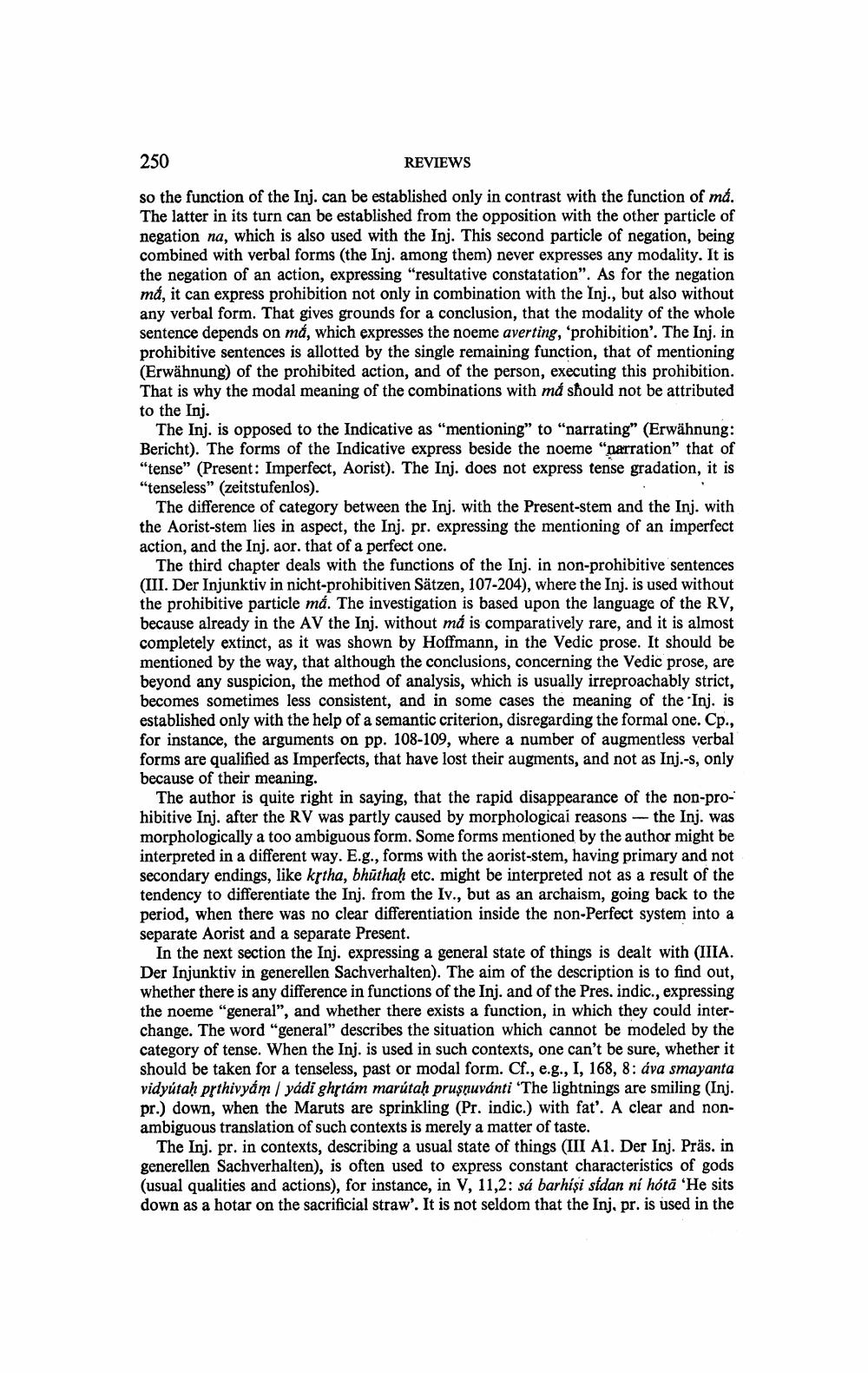Book Title: Reviews Of Different Books Author(s): Publisher: View full book textPage 4
________________ 250 REVIEWS so the function of the Inj. can be established only in contrast with the function of ma. The latter in its turn can be established from the opposition with the other particle of negation na, which is also used with the Inj. This second particle of negation, being combined with verbal forms (the Inj. among them) never expresses any modality. It is the negation of an action, expressing "resultative constatation". As for the negation ma, it can express prohibition not only in combination with the Inj., but also without any verbal form. That gives grounds for a conclusion, that the modality of the whole sentence depends on ma, which expresses the noeme averting, 'prohibition'. The Inj. in prohibitive sentences is allotted by the single remaining function, that of mentioning (Erwahnung) of the prohibited action, and of the person, executing this prohibition. That is why the modal meaning of the combinations with ma should not be attributed to the Inj. The Inj. is opposed to the Indicative as "mentioning" to "narrating" (Erwahnung: Bericht). The forms of the Indicative express beside the noeme "parration" that of "tense" (Present: Imperfect, Aorist). The Inj. does not express tense gradation, it is "tenseless" (zeitstufenlos). The difference of category between the Inj. with the Present-stem and the Inj. with the Aorist-stem lies in aspect, the Inj. pr. expressing the mentioning of an imperfect action, and the Inj. aor. that of a perfect one. The third chapter deals with the functions of the Inj. in non-prohibitive sentences (III. Der Injunktiv in nicht-prohibitiven Satzen, 107-204), where the Inj. is used without the prohibitive particle ma. The investigation is based upon the language of the RV, because already in the AV the Inj. without ma is comparatively rare, and it is almost completely extinct, as it was shown by Hoffmann, in the Vedic prose. It should be mentioned by the way, that although the conclusions, concerning the Vedic prose, are beyond any suspicion, the method of analysis, which is usually irreproachably strict, becomes sometimes less consistent, and in some cases the meaning of the "Inj. is established only with the help of a semantic criterion, disregarding the formal one. Cp., for instance, the arguments on pp. 108-109, where a number of augmentless verbal forms are qualified as Imperfects, that have lost their augments, and not as Inj.-s, only because of their meaning. The author is quite right in saying, that the rapid disappearance of the non-prohibitive Inj. after the RV was partly caused by morphologicai reasons the Inj. was morphologically a too ambiguous form. Some forms mentioned by the author might be interpreted in a different way. E.g., forms with the aorist-stem, having primary and not secondary endings, like krtha, bhuthah etc. might be interpreted not as a result of the tendency to differentiate the Inj. from the Iv., but as an archaism, going back to the period, when there was no clear differentiation inside the non-Perfect system into a separate Aorist and a separate Present. In the next section the Inj. expressing a general state of things is dealt with (IIIA. Der Injunktiv in generellen Sachverhalten). The aim of the description is to find out, whether there is any difference in functions of the Inj. and of the Pres. indic., expressing the noeme "general", and whether there exists a function, in which they could interchange. The word "general" describes the situation which cannot be modeled by the category of tense. When the Inj. is used in such contexts, one can't be sure, whether it should be taken for a tenseless, past or modal form. Cf., e.g., I, 168, 8: ava smayanta vidyutah prthivyam / yadi ghytam marutah prusnuvanti 'The lightnings are smiling (Inj. pr.) down, when the Maruts are sprinkling (Pr. indic.) with fat'. A clear and nonambiguous translation of such contexts is merely a matter of taste. The Inj. pr. in contexts, describing a usual state of things (III A1. Der Inj. Pras. in generellen Sachverhalten), is often used to express constant characteristics of gods (usual qualities and actions), for instance, in V, 11,2: sa barhisi sfdan ni hota 'He sits down as a hotar on the sacrificial straw'. It is not seldom that the Inj, pr. is used in thePage Navigation
1 2 3 4 5 6 7 8 9 10 11 12 13 14 15 16 17 18 19 20 21 22 23 24 25 26 27 28 29 30 31 32 33 34 35 36 37 38 39 40 41 42 ... 48
